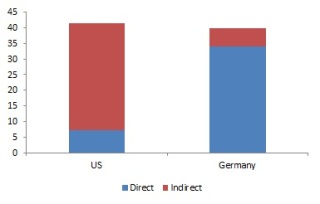Greece has received a lot of publicity since its financial problems surfaced last year. And yet it seems like many people still don’t think Greece’s problems are all that important. For example, last week I heard a popular financial radio host basically ridicule the notion that Greece’s financial issues could affect America. His reasoning was that Greece’s economy is tiny compared to the Eurozone or the US (in terms of GDP), and because of that, a Greek failure is nothing for Americans to worry about. Well, here are a few things to consider.
First, the problem is measured by the amount of money that Greece owes to various creditors and not by the size of Greece’s economy, so it doesn’t make sense to arbitrarily compare GDP values. Also, the fact that Greece’s debt burden is greater than its GDP would make that exercise faulty anyhow. And ironically enough, Greece’s tiny economy is actually making matters worse – since a larger economy could help Greece get out of debt faster.
Second, the US has more exposure to Greek debt than people realize. European investors may have been the primary buyers of Greek debt, but US banks were the primary insurers against a Greek default. In other words, if Greece doesn’t pay, then US banks may be liable for losses (even without holding the debt). Figure 1 shows this point clearly. Compared to Germany, the US directly purchased much less Greek debt. However, adjusted for indirect exposure, the US actually has more overall exposure to Greece than Germany does.
US vs. Germany
Values are in billions of USD
Source: Bank of International Settlements, BCM
And third, Greece is only the tip of the iceberg. If Greece fails, then who’s next? Remember that there are a number of peripheral Eurozone countries with their own financial problems including Portugal, Ireland, and Spain. If Greece doesn’t pay, then why should they? Taken together the problem doesn’t look so tiny anymore. Given the risk of contagion, it could actually make the financial crisis of 2007 look like a walk in the park. And yes, the US has exposure to those other countries as well.
I’m no policy guru and I don’t claim to have the solutions. I’m just pointing out that the problems brewing in little old Athens are much bigger than some “financial experts” claim. A Greek default will have worldwide repercussions that can impact even the mighty US of A. If you still can’t see why that is, then please refer to Figure 2 below.
This blog is for informational purposes only. Nothing on this blog constitutes investment advice. Bellwether Capital Management LLC does not provide tax or legal advice. You should conduct proper due diligence and/or consult with your professional advisers before taking any investment action.


Victor, you are right on target. To my astonishment the other day, I dug into the holdings of the ONLY money market fund option in my employer's 401k plan, where I have cash stashed for liquidity and safety.. It is JINXX, JP Morgan Prime Money Market Fund.. The word “prime” is the clue that is is stretching for a little extra yield. 30/60/90 day CDs in French and German Banks and Asset Backed CP make up over half of the assets! If Europe gets a run on the banks due to their opaque exposure to Greece, those very banks might be hard pressed to payup on time, leaving investors hoping that JP Morgan steps in to provide for its fund. I'm not saying that anything bad will happen, but that's an example of the hidden exposure that most citizens aren't thinking about, but hopefully advisors like you are a step ahead!
LikeLike